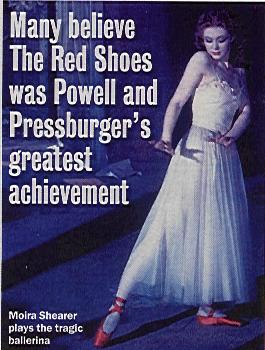 Around 1937, a Hungarian-born writer named Emeric Pressburger wrote a
film called The Ballet of the Red Shoes and sold it to Alexander Korda,
then the biggest movie mogul in Britain. Korda, however, never got around
to producing the picture, and ten years later Pressburger persuaded his
partner, the director Michael Powell, that they should buy back the
screenplay and film it themselves.
Around 1937, a Hungarian-born writer named Emeric Pressburger wrote a
film called The Ballet of the Red Shoes and sold it to Alexander Korda,
then the biggest movie mogul in Britain. Korda, however, never got around
to producing the picture, and ten years later Pressburger persuaded his
partner, the director Michael Powell, that they should buy back the
screenplay and film it themselves.
The approach had to be casual because Korda was a canny businessman who,
had he known they were very keen on the project, would have screwed them
for every penny he could get. So they pretended they weren't very keen,
that Pressburger merely wanted the story for sentimental reasons, and a
deal was struck.
In his autobiography, A Life in Movies, Michael Powell wrote, "Emeric
had not been paid very much for his original story script. But times had
changed, and when a price of £18,000 was quoted, we were in no mood
to
argue. Alex bought another Monet and we got on with the rewrite."
Just consider that for a moment. In 1947, you could actually buy a Monet
for £18,000. Today you'd probably have to pay as much for the artist's
signature on a laundry list. But equally wondrous is the fact that also
in 1947 you could buy the rights to The Red Shoes (Saturday BBC2), with
a first-draft screenplay included, for £18,000. And when you reflect
that
today the rights to an unwritten novel by such as John Grisham change
hands for seven figures, you wonder whether Korda or Powell and Pressburger
got the better bargain.
Together P and P were probably the most consistently successful and
influential British film-makers of the century. (In his later years,
indeed, Michael Powell became a guru to the likes of Francis Coppola and
Martin Scorsese.) And there are many who believe The Red Shoes was their
finest achievement. It's a great film, timeless as the classics always
are - bold, superbly executed fusion of music, dance and painting, of
realism and fantasy, that made an instant star of the hitherto little-known
Scottish ballerina Moira Shearer. The basic story - of the girl whose
Red Shoes would not let her stop dancing - is from Hans Christian Andersen,
but the film goes far beyond that, with the central character torn between
devotion to her art and the demands of her impresario, Anton Walbrook, and
her jealous husband, Marius Goring.
Ironically, Moira Shearer was not all that keen on playing the part. She
prevaricated so long that Powell had even screen-tested another dancer
before Shearer finally agreed. And though she was barely 22 when The Red
Shoes won her international acclaim, she only made another five movies,
two of them (The Tales of Hoffmann and Peeping Tom) directed by Michael Powell.
The reason? Ballet, not film, was her passion and besides, to quote the
Powell autobiography again, "Moira never made any secret of the fact that
she played in The Red Shoes for money. She proclaimed it from the
housetops ... She was a dancer, not an actress."
Splendid though it is, The Red Shoes would have several rivals for the
title of the best of all Powell-Pressburger pictures, The Life and Death
of Colonel Blimp and A Matter of Life and Death among them. But it was
clearly one of Powell's favourites because he devotes more than 50 pages
to it in A Life in Movies. On the other hand, he makes only one fleeting
reference to Gone to Earth (also Saturday BBC2), an adaptation of Mary
Webb's bucolic novel of passion, betrayal and fox hunting in Victorian
Shropshire. And although the Hollywood star Jennifer Jones does rather well
as the hapless heroine, I can understand Powell's reticence. It's a film
that never really comes to life. But then even P and P couldn't win them
all.
Barry Norman
Radio Times 5-11 December 1998
Back to index


 Around 1937, a Hungarian-born writer named Emeric Pressburger wrote a
film called The Ballet of the Red Shoes and sold it to Alexander Korda,
then the biggest movie mogul in Britain. Korda, however, never got around
to producing the picture, and ten years later Pressburger persuaded his
partner, the director Michael Powell, that they should buy back the
screenplay and film it themselves.
Around 1937, a Hungarian-born writer named Emeric Pressburger wrote a
film called The Ballet of the Red Shoes and sold it to Alexander Korda,
then the biggest movie mogul in Britain. Korda, however, never got around
to producing the picture, and ten years later Pressburger persuaded his
partner, the director Michael Powell, that they should buy back the
screenplay and film it themselves.